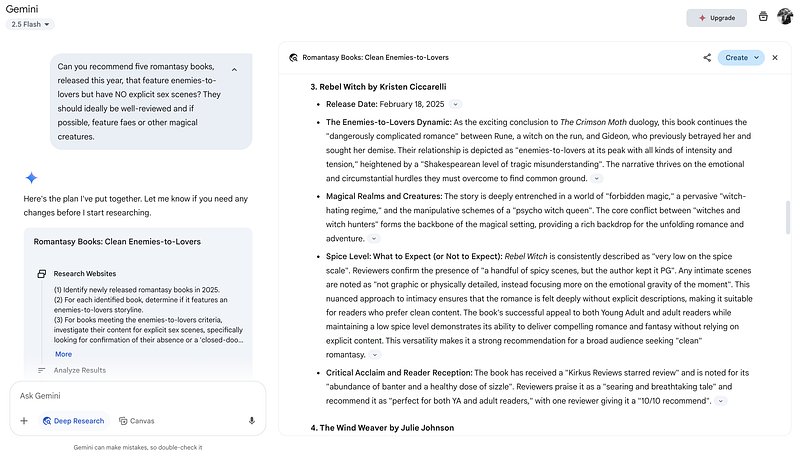Hi there,
I’ll admit it upfront: the subject line of this Reedsy marketing newsletter might sound a bit sensationalist. But if you watched Google’s I/O keynote yesterday, you’ll know it's no exaggeration.
The way readers discover books online is about to change forever — because the way we search the Internet is changing right now.
It started when chatbots like ChatGPT, Bing Chat (now Copilot), and Claude appeared. Instead of Googling, you could ask these AI tools questions directly. But they had limitations: outdated information, no real-time access, and occasional hallucinations. Perplexity, the first true AI search engine, then emerged at some point, but adoption remained limited. Bing’s Generative Search had similar adoption challenges.
Who’s missing from this pack, though? Just the one player who’s dominated Internet search over the last two decades: Google. After all, we all know that if you want to know anything, you just Google it.
Google couldn’t lag behind for long in the AI race, and yesterday’s I/O keynote — and in particular, the announcement of AI Mode in search — showed just that.
In short, say goodbye to traditional blue links. They're being replaced by detailed AI-generated answers. Whether this makes for a better user experience or not (personally, I don't love it), Google clearly believes it's the future.
“Great, Ricardo — but what does this have to do with books?”
If online search changes, so does online discoverability — for websites, services, and products… including books. To go back to our subject line: the way readers find and search for books is about to change forever.
“I’ve never used Google to find books anyway — why should I care?”
Two reasons:
- This is not just about Google: generative search will become the standard everywhere. You know that Amazon search bar (the one readers use every day)? It is bound to become LLM-powered, as are the search bars of Goodreads, TikTok, Twitter, and anywhere else you can think of.
- While Google has never been a great place to search for books before, this could very well change now.
Here’s an example. I’m an epic fantasy reader, and though I’ve been curious to delve into romantasy for a while now (to see what the fuss is all about), I don’t really like explicit sex scenes in my books.
Now, I could ask fellow reader friends for recommendations, or I could spend a really long time browsing through dozens of romantasy books online to see whether they could be a good fit or not for me.
Or… as of yesterday, I can actually ask Google — or rather, Gemini. Which is what I did.

And the answer was… scary good (though it did take 2-3 minutes to come in).
Using the “Deep Research” feature, Gemini analyzed over 100 websites to provide five ideal recommendations — some of which I’ve actually added to my TBR pile. If you’re curious, you can read the entire answer here (it’s loooooong).
Now, is this a better experience for the reader? Absolutely. It would’ve taken me hours to find equally relevant recommendations otherwise. I can definitely see readers increasingly using deep AI search to find their next read.
So what can you do to prepare? First, play with these tools. Try out Google’s AI mode, as well as Gemini’s Deep Research, and run some searches of your own. Think about how your ideal reader could search for a book like yours, run that search, and see what comes up.
Note: These features are only available in the US. If you’re based elsewhere (like me), use a VPN.
Naturally, this paradigm shift also prompts a bunch of questions. Will generative search drive more visibility to debut or less known authors? Or will it further reinforce the dominance of the famous ones? Will it favor traditionally published books over indie ones? In my search, for example, all recommendations came from the Big Five (two from HarperCollins, two from PRH, one from Macmillan).
It’s too early to say, and it will likely change quickly. But over the course of the next newsletters, I’ll dive deeper into generative search, analyze what factors LLMs tend to favor (and why), and share what we authors can do to prepare for the future of search.
Until then, happy writing, and happy searching!
Ricardo

|
|||
|
Top publishing professionals can help make your writing dreams a reality. Sign up to meet them. |

|
Copyright © 2026 Reedsy, All rights reserved.